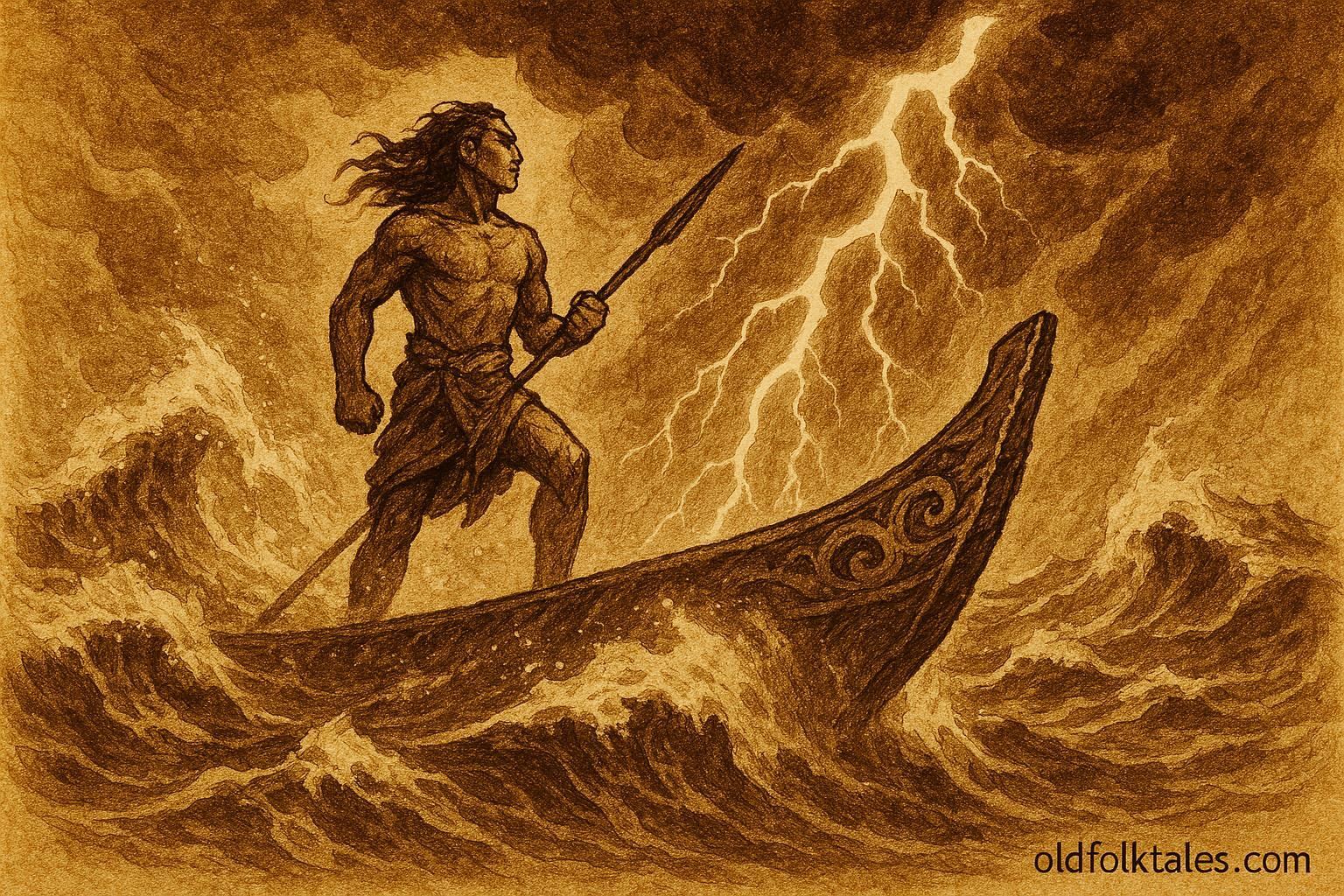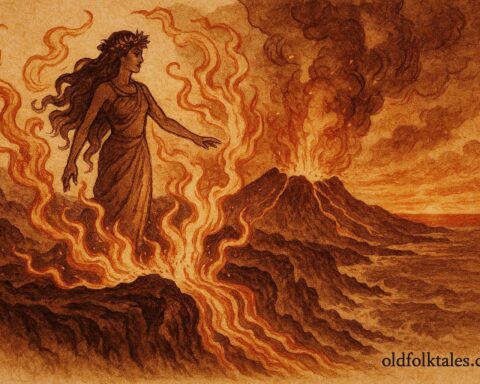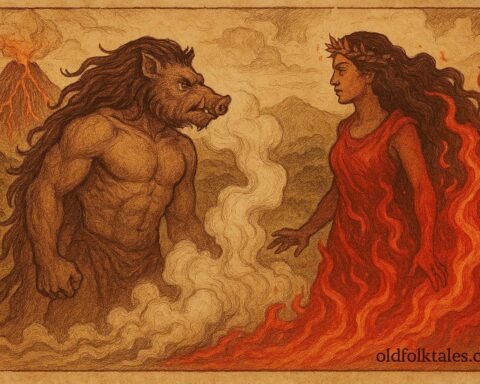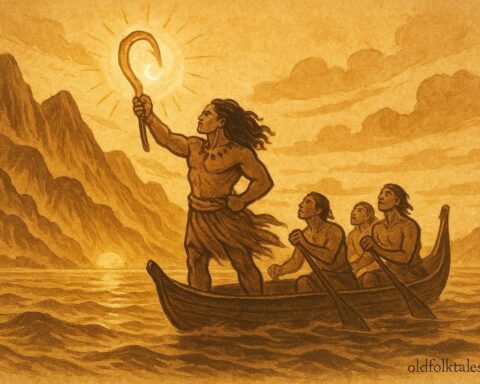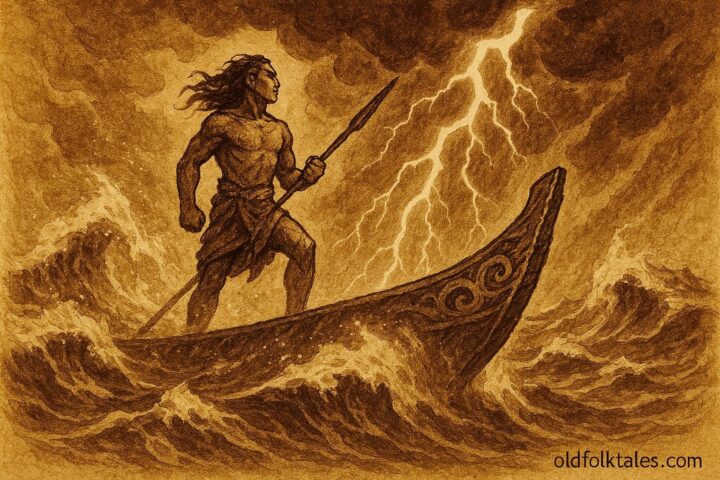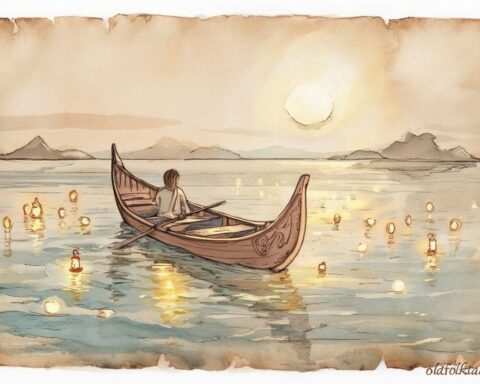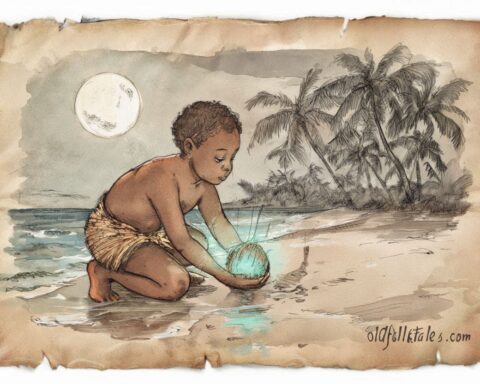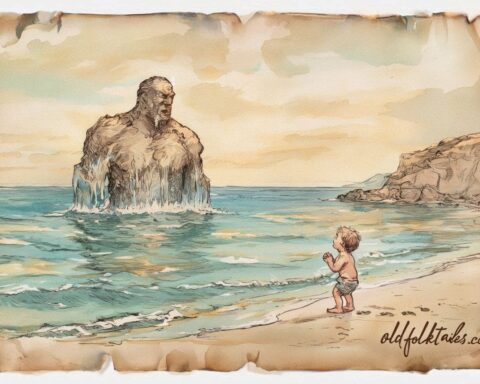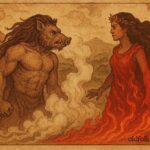Long ago, in the islands of Tahiti, when gods still walked among humankind and the sea was a living spirit, there lived a man unlike any other. His name was Hiro, the great navigator, the daring thief, and the cunning trickster. Tales of his feats echoed across the islands, some spoke of his cleverness with awe, others whispered of his arrogance with fear.
Hiro was no ordinary man. He possessed strength that rivaled the sea’s own power and a mind as sharp as obsidian. He could read the winds, trace the stars, and tame the ocean’s temper. Yet, above all, Hiro hungered for glory, not to serve the gods or his people, but to prove that no force in the world could match his own.
The Dream of the Magic Canoe
One night, while resting beneath the moonlit palms, Hiro dreamed of a canoe, not just any vessel, but one that could outpace the wind itself. It would glide over the sea like a bird in flight, crossing vast distances in the blink of an eye. In his dream, the ocean spirits whispered, “Build this canoe, Hiro, and the world shall bow to your name.”
When he awoke, the dream clung to him like salt upon his skin. He rose before dawn and went into the sacred forest to gather the finest timber. The birds fell silent as he entered, for they sensed that mortal hands were about to disturb the dwelling place of spirits.
With chants taught to him by ancient priests, chants that called upon the guardians of the forest, Hiro struck his adze upon the first tree. But instead of anger, the spirits answered with curiosity. “What do you seek, man of the sea?” they asked from the rustling leaves.
“I seek to build the swiftest canoe ever known,” Hiro replied boldly. “A vessel fit for one who can master both wind and wave.”
The forest spirits, amused by his audacity, agreed to aid him. They whispered secrets of crafting that only gods should know, how to bend wood without breaking it, how to sing the planks into harmony, and how to weave enchantment into the lashings that held them together.
The Birth of the Great Canoe
Days passed, then weeks. Under the forest’s watchful gaze, Hiro labored with tireless strength. When at last the canoe was finished, it gleamed like polished stone. Its hull shimmered with faint patterns of light, and when it touched the water, the sea itself seemed to stir with anticipation.
Hiro named it Va‘a-tae-rua, “The Canoe of the Two Currents,” for it could move with or against the flow, answering only to its master’s will. With a single chant, Hiro could make it fly over the waves faster than the eye could see.
When he sailed it for the first time, even the gods watched from the heavens. The winds followed him; the ocean bowed beneath him. Wherever he went, he left mortals awestruck and chiefs humbled. He visited distant islands, stealing treasures and sacred relics from those who had once mocked him. None could catch him; none could outwit him.
Hiro’s Pride and the Warning of the Gods
But Hiro’s heart, once filled with wonder, grew heavy with pride. He began to boast that even the gods could not match his craft or his speed. His laughter echoed across the sea like thunder.
One evening, as he prepared to sail once more, an old priest came to him and said, “Hiro, your canoe is great, but it was not built by your strength alone. You called upon sacred spirits, honor them, lest your gift turn to your curse.”
Hiro waved him off. “The spirits served me because they saw greatness,” he said. “Even the gods must bow to skill.”
The priest looked at him sadly and whispered, “No man rules forever upon the sea.”
The Challenge of the Storm
The gods had heard Hiro’s words. Angered by his arrogance, they decided to test him. The next time Hiro set sail, the sky darkened without warning. Winds howled like beasts, and the sea rose in walls of roaring water. Yet Hiro only laughed.
“Do you think to frighten me?” he cried into the storm. “I am Hiro, master of the ocean!”
He chanted the words that once made his canoe soar, but this time, the spell faltered. The waves struck harder, the winds turned against him, and his magic chants were drowned by thunder. Still, he pressed on, refusing to yield.
At the height of the storm, the sea split open with a voice like the roar of the gods. “You have taken what was sacred and made it your pride,” the voice thundered. “Now your pride shall be your undoing.”
Lightning flashed, striking the canoe’s prow. The enchanted vessel trembled and turned to stone before Hiro’s eyes. The once-living wood hardened, its shimmer fading to gray.
Hiro leapt into the water, but the sea, now angry, pulled him down. Some say he drowned and became a spirit of the deep. Others say he was turned to coral, forever bound to the world he had tried to master.
The Legacy of Hiro
The stone canoe still lies upon a Tahitian shore, its outline visible when the tide recedes, a reminder of Hiro’s greatness and his fall. The islanders tell their children, “See that rock? Once it was the canoe of Hiro, who sailed too proudly and forgot to honor the gods.”
Thus the legend of Hiro endures, part hero, part warning. He remains both admired and pitied, a man who touched the realm of the divine but could not bear its weight.
Discover the adventures of Māui, Pele, and Tangaloa in the timeless Polynesian oral tradition
Moral Lesson
The tale of Hiro teaches that genius and ambition are powerful gifts, but without humility, they become curses. Respect for the forces greater than oneself, the gods, the spirits, and the balance of nature, is what keeps greatness from destruction.
Knowledge Check
- Who was Hiro in Tahitian mythology?
Hiro was a trickster hero, navigator, and craftsman known for building a magical canoe and challenging both men and gods. - How did Hiro build his magical canoe?
He received help and secret knowledge from the spirits of the forest, who taught him sacred chants and crafting techniques. - What was special about Hiro’s canoe?
It could sail faster than the wind and move with or against the current, guided by Hiro’s magical chants. - What led to Hiro’s downfall?
His arrogance and disrespect for the gods, boasting that even divine powers could not match his skill. - What happened to Hiro’s canoe?
The gods turned it to stone as punishment for his pride, leaving it as a warning to future generations. - What is the moral lesson of Hiro’s story?
Ingenuity must be balanced with humility; those who challenge the divine order are doomed to fall.
Source: Adapted from “Ancient Tahiti” by Teuira Henry (1928), based on oral accounts from Tahitian priests and chiefs.
Cultural Origin: Tahitian (Society Islands, Polynesia)
